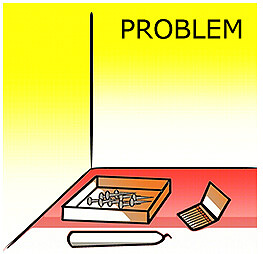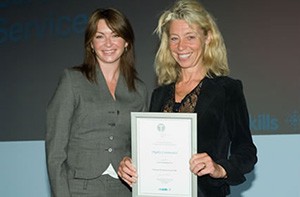Just how do you keep motivated at work? Read our top three tips to keep motivated at work and increase your job satisfaction and re-energise your career:
What makes you most motivated at work?
Typically management theorists have focused on:
- Earning a big salary
- Having meaningful work
- Feeling competent
- Having control over your work
- Having like minded colleagues to socialise with
Which would you choose? Maybe all of them!
Surprisingly, financial incentives do not increase our job satisfaction, productivity or creativity unless the task is routine and mechanical. Professor Glucksberg at Princetown university did an experiment to see which of two groups could more speedily solve the famous Dunker conundrum of how to fix a candle to the wall when given a candle and a box of tacks.
 The first group was told that they were establishing norms and averages for how long it would take.
The first group was told that they were establishing norms and averages for how long it would take.
The second group were told they would be financially rewarded, the top 25% getting 4 dollars and the fastest person getting 20 dollars.
The group who were going to get dollars took three and a half minutes longer! Glucksberg claims that extrinsic motivators can actually restrict our creativity and productivity, making us narrow minded and blinkered.
But do we find it too difficult to focus on purposeful work unless we are earning what we consider a good enough salary? That is, does salary derail us from any higher aspirations?
Maslow in his Hierarchy of Needs theory concluded that unless we have our basic physiological and security needs met we can’t aim for purpose and meaning in our lives and work.
This might be true for many of us but how many struggling artists, musicians and actors have I seen who are so devoted to their muse that they continue to find ways to achieve their vision of success, even when their basic needs are hardly being met! They are definitely motivated at work.
Hertzberg distinguished motivators from dis-satisfiers and claimed that extrinsic factors such as a big office, a nice environment and a glamorous car can remove dissatisfaction but we need intrinsic factors such as purposeful work, achievement, responsibility and growth to truly motivate us.
My experience of career coaching people wanting to make a career change is that they often focus on extrinsic motivators such as salary, location and hours worked. Obviously these do matter but scientific theories and common sense tell us that they can’t provide job motivation on their own and job satisfaction and productivity have been closely matched with being motivated at work.
How satisfied are you at work?
First motivation secret: Identify intrinsic motivators
- Try to get a focus on what would give you meaning in your work; what would match your values and interests and what strengths and skills you would love to be using. Make a list of what is important to you and weigh these up against possible roles and what you are currently doing to gauge what might meet your motivators.
- You might find that your current work does meet many of your motivators but that you need to change where or how you work.
- You might find that the extrinsic factors matter less and that you can compromise, as long as your key intrinsics are being met.
Daniel Pink, psychologist and author claims the three universal motivators are:
- Autonomy – the desire to control our own lives;
- Mastery – the desire to increase our competence and
- Purpose – the desire to do something larger than ourselves.
This may be true but the biggest complaint I hear from my career coaching clients is lack of feedback and appreciation. However purposeful your work, you generally want to know that you are valued and recognised for what you do and not being noticed can be very de-motivating.
If your work is excellent but you remain buried in your office how will anyone know you are doing a good job?
Second motivation secret: Get noticed
- Try to showcase your skills and strengths by offering to join a cross functional project
- Offer to speak at an upcoming seminar or conference
- Recommend colleagues and show generosity in attributing work to them as this also helps you to be noticed.
- Ask for feedback from colleagues and your manager
In a recent career coaching meeting my client explained that although their work was meaningful and although they felt competent to achieve it they were just burnt out : the language they used was, “I feel I am putting far more in than I am getting out!”.
Adams developed a theory of Equity which explains how we measure our inputs against the outcomes and calculate the ratio. If we feel we are putting in more hours, making more effort and sacrificing more of our own time than we are getting out ie. recognition, social reward, pay and perks, we feel cheated. We also compare ourselves with others and feel dissatisfied if their ratio seems fairer than ours.
Adams says we can either make less effort, or try to increase the outcomes, or think differently about what we are doing and finally if nothing works we can leave!

How fairly do you feel you are being treated?
Third motivation secret: Take control of inputs and outcomes
- Try to increase your outcomes by putting a business case to your manager.
- Aim to reduce any unnecessary inputs e.g. working longer not smarter.
- Take a broader perspective and re-evaluate your outputs and those of others
- If none of these work you might need to consider a job change!
Career Counselling Services specialises in helping you evaluate your current work situation and enables you to find work which is motivating, fulfilling and satisfying.
See our website www.careers.counselling.services.co.uk or email us at info@career-counselling-services.co.uk to see how we can help you.

